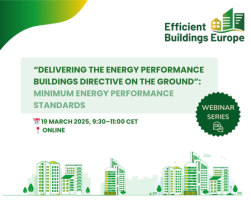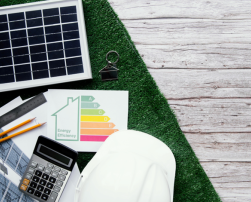Topic of the Month (November 2024)
Each month a relevant topic and several sub-topics are covered in detail. For the Topic of the Month, content following a common thread is developed by BUILD UP Editorial Board in collaboration with the Board of Ambassadors and other relevant experts in the field. This includes producing articles, case studies, webinars and more, all in line with the specific topic selected. Relevant events are also identified and highlighted.
Topics of the Month are announced at the end of the previous month in our website and newsletter. Please write us if you wish to know more about our upcoming topics of the month.

The webinar explored the role of Minimum Energy Performance Standards (MEPS) in improving building efficiency under the Energy Performance of Buildings Directive (EPBD). Discussions covered regulatory frameworks, national MEPS initiatives, financial incentives, and digital tools for large-scale renovations.

Energy Performance Certificates are key to improving building efficiency, but their reliability and harmonisation remain challenging. With ambitious environmental targets at stake, Europe is racing to unlock their full potential and ensure they drive real change.

The Smart Square project develops tools to assess building intelligence through the Smart Readiness Indicator (SRI), with audits in pilot buildings, an observatory for monitoring progress, and a call centre issuing over 3,600 ratings.

The Centre for Research & Technology Hellas (CERTH) is proud to announce the launch of the Building Dynamic Energy Assessment Tool (BDEA), an advanced platform developed within the REN+HOMES project. The tool redefines the way buildings are assessed for energy performance and smart readiness.

This review examines European research on the price premium of energy-efficient homes, finding positive effects but highlighting challenges like data limitations and omitted variable bias, with recommendations for improved data infrastructure and tailored policies.

Montgomery Sisam Architects designed a modular, energy-efficient Passive House building in Hamilton with 24 units to address homelessness, featuring prefab construction, photovoltaic panels, and community spaces.

Construction accounts for 40% of global emissions. Strategies such as using sustainable materials, optimised processes and green certifications reduce emissions, waste and costs while delivering long-term environmental, economic and social benefits.

The study highlights growing demand for Environmental Product Declarations (EPDs) in Germany’s building industry, driven by building certifications, EU regulations, and the need for life cycle assessments, with challenges in data availability and certification processes.

This policy needs report outlines the requirements and strategies for EU Member States to implement the 2024 Energy Performance of Buildings Directive, focusing on zero-emission buildings, renovation plans, energy performance standards, and ensuring social acceptance.
According to Passive House principles, the EU-project outPHit promotes deep retrofits which are cost-efficient and reliable. Based on model projects and with the cooperation of many partners, outPHit opens up ways to implement deep energy retrofits. In the process, solutions with a one-stop-shop approach reduce the effort for planning, execution and
quality assurance.
